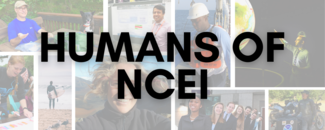
At NCEI, we aren’t just data—we are people. In our Humans of NCEI series, meet the awesome minds that manage one of the largest archives of atmospheric, coastal, geophysical, and oceanic research in the world. Get to know Pamela Wyatt, a space weather data scientist with the Cooperative Institute for Research in Environmental Sciences (CIRES), who processes and manages data from the Geostationary Operational Environmental Satellites, also known as GOES.
What was your first job? How did it prepare you for your current position?
After graduating from the University of Colorado, my first job was working for the Carnegie Observatories in Pasadena, CA. I was hired as the research assistant to then Director Wendy Freedman. Including working on site at the observatory in Chile, it was there that I first began to work directly with astronomical data and learned more about data processing, storage, and analysis.
How did you end up at NCEI?
Being from Colorado originally, I always hoped to come back home, so when a position working with satellite data at NSIDC (National Snow and Ice Data Center) came up, I was happy to get it. After seven years on the OPS team there, the space weather data scientist position at NCEI offered the opportunity to get back to my primary interest: space science.
What does a usual workday look like for you?
Typically, mornings are spent monitoring archival processes and storage capacity of various volumes. Based on specific needs, I also develop computer processes and scripts to automate tasks like ingesting and monitoring data. I'm responsible for the GOES-R website, where new satellite data are announced and made available for download by scientists and the public, which includes addressing users' questions/issues.
What question are you asked most often when someone finds out what you do? How do you respond?
"What exactly is 'space weather' and why study it?" is the most typical question I'm asked. I give a response that drives home how space weather can affect organizations and individuals: Any activity on the Sun’s surface (e.g., eruptions, solar wind, or flares) is essentially what we mean by "space weather." These events can affect Earth, the rest of the solar system, and anything in between, i.e., satellites. That generally gets people's attention—if satellites can be affected that could translate to TV, radio, or cell phone problems, not to mention GPS outages or electrical grid disruptions. Lastly, I explain that a big part of this work is to be aware of hazardous space weather conditions before any potential adverse effects impact technologies upon which we've become so reliant.
What sort of training and education would one need for your job?
My own degrees are in Astrophysics and Applied Mathematics, both of which are extremely helpful in my work. I am also pursuing a graduate degree in Computer Science, which I see as invaluable to any tech job where acumen in areas such as data warehousing, storage concepts, and enterprise strategy is essential.
What inspired you to pursue a career in your field?
Initially just a simple love of astronomy and curiosity about the universe. Today, I still marvel at the incredible advances that technologies may reveal, and I can't wait!
What projects are you working on now? Are there any upcoming projects that you are excited about?
My primary focus is processing and managing data from the Geostationary Operational Environmental Satellites (GOES-R Series) and their respective instrument suites. This four-satellite program currently includes GOES-R and GOES-S, but we will also add GOES-T when it launches in late 2021. Very exciting!
What is your favorite aspect of your job?
The dynamic nature of tasks, the applied science, and variety of wonderful people working toward a common goal.
Who are you outside of your career?
Though I am still known to stargaze and seek out scientific talks, I also have many hobbies and interests outside of work. I am an avid lover of board games. I enjoy most winter sports like snowboarding and snowshoeing. Some close friends and I regularly play pub trivia and have made it to several national tournaments. Lastly, I am a longtime scooter and dual sport motorcycle rider, the combination of which has taken me on two wheels across America and to remote places in Baja, Costa Rica, and India.
*Please note that all of the information was current through the publication date.




